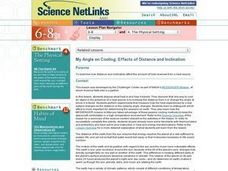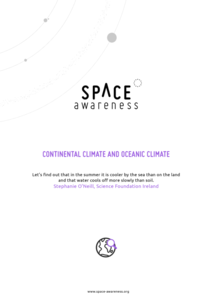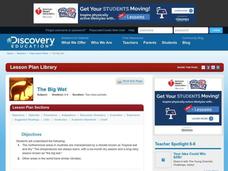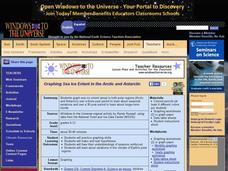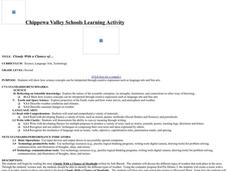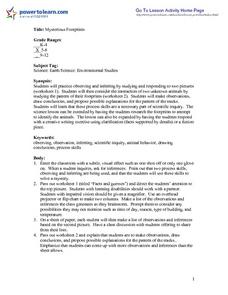Curated OER
Rain and Rainbows
Students explore the weather system by analyzing water properties. In this precipitation lesson, students review weather related vocabulary terms and discuss how rainbows are created by light hitting droplets at the right time. Students...
National Wildlife Federation
I Speak for the Polar Bears!
Climate change and weather extremes impact every species, but this lesson focuses on how these changes effect polar bears. After learning about the animal, scholars create maps of snow-ice coverage and examine the yearly variability and...
Montana State University
What's the Weather?
How many jackets do you need to stay warm and climb Mount Everest? An informatie resource covers the topic of Mount Everest, the resource helps young scientists discover the difference between climate and weather. Activities include...
National Wildlife Federation
I’ve Got the POWER! Solar Energy Potential at Your School
Should every school have solar panels? The 19th lesson in a series of 21 has scholars research the feasibility of using solar panels at their school. They begin by gathering data on the solar energy in the area before estimating the...
Polar Trec
What Can We Learn from Sediments?
Varve: a deposit of cyclical sediments that help scientists determine historical climates. Individuals analyze the topography of a region and then study varve datasets from the same area. Using this information, they determine the...
Curated OER
My Angle on Cooling: Effects of Distance and Inclination
Learners discuss what heat is and how it travels. They discover that one way to cool an object in the presence of a heat source is to increase the distance from it or change the angle at which it is faced.
Space Awareness
Continental Climate and Oceanic Climate
There's nothing better than a cool breeze blowing in from the ocean. Scholars explore how water affects change in temperature using a hands-on experiment on climate. They use measurement tools to compare the continental and oceanic...
NOAA
Ocean Layers II
Now that you know the ocean has layers, let's name them. The seventh installment of a 23-part NOAA Enrichment in Marine sciences and Oceanography (NEMO) program covers terminology associated with ocean layers, such as thermocline and...
Curated OER
Cloud Observations using GLOBE Protocols
Students observe which of ten types of clouds are visible and how much of the sky is cloud covered. They see that by observing clouds, we can get information about temperature, moisture, and wind conditions in different places in the...
Virginia Department of Education
Hurricanes: An Environmental Concern
Hurricanes, typhoons, and tropical cyclones are the same type of storm, but their names change based on where they happen. Scholars use a computer simulation to learn about hurricanes. Then they hypothesize ideas to prevent hurricanes...
Curated OER
The Weather Around Us
First graders explore weather patterns. In this weather lesson, 1st graders research the daily weather by creating a graph of the daily weather conditions. Students use the computer to access information regarding the weather forecast....
Curated OER
The Big Wet
Students complete a research project. In this climate lesson, students learn about the climate "tropical wet and dry" found in Australia. Students work in groups to research aspects of this climate and then create a class presentation.
Curated OER
Graphing Sea Ice Extent in the Arctic and Antarctic
Students graph sea ice data and predict long term trends in the data. In this climate change lesson, students use sea ice data from the Arctic and Antarctic to construct line graphs. They use their graphs to predict the effects of global...
Curated OER
Is the Hudson River Too Salty to Drink?
Students explore reasons for varied salinity in bodies of water. In this geographical inquiry lesson, students use a variety of visual and written information including maps, data tables, and graphs, to form a hypothesis as to why the...
Curated OER
Our Sky Clock
Students explore space science by completing a worksheet in class. In this astronomy lesson, students discuss and identify star patterns in the night sky and relate these patterns to the approximate time they appear. Students complete an...
Curated OER
Cloudy With a Chance of...
Second graders will write a story. In this writing and meteorology instructional activity, 2nd graders read the story Cloudy With a Chance of Meatballs, then use KidPix to create a weather picture. The picture is imported into a word...
Curated OER
Mysterious Footprints
Young scholars, after observing and responding to two pictures, consider the interaction of two unknown animals by examining the pattern of their footprints. They make observations, draw conclusions and propose possible explanations for...
Curated OER
Hurricanes and Tornadoes (Grade 4-8)
Young scholars investigate the concepts of hurricanes and violent weather conditions. In this violent weather lesson, students access an Internet site and watch a video about how air masses behave, how a tornado forms, how hurricanes...
Curated OER
Building a Scale Model
Third graders create a model of the solar system. In this solar system instructional activity, 3rd graders create a scale model of the solar system. Working in pairs students solve mathematical problems to correctly measure the distance...
Curated OER
Water Table
Learners predict from a rock sample whether a water well could be drilled in that type of rock. They predict what conditons would be necessary for the well to produce water.
Curated OER
Exploring the Night Sky: Fall/Winter
Students explain how moon phases occur. They explain three ways that the night sky has been used through history. Students locate some of the constellations in the night sky. They discuss stories and myths surrounding stars.
Alabama Learning Exchange
Weather Detectives
Second graders make weather observations and record data. They use the internet to get data on the weather. After 5 days students predict the weather for the next 3 days.
Curated OER
Three Clouds Activity
Students explore how clouds are produced through three different age-appropriate hands-on experiments.
Curated OER
Greenhouse Effect
Pupils investigate the greenhouse effect. In this environmental lesson, students investigate why the greenhouse effect changes the climate through an experiment. Pupils use vinegar to simulate how acid damages the environment.
Other popular searches
- Planet Earth Seasons
- Seasons and Earth Movement
- What Causes Earth Seasons
- Tilt of Earth Seasons
- Earth Seasons and Tilt
- Earth Seasons and Moon
- Earth Seasons Vocabulary
- Earth Seasons Axis
- Earth Seasons Projects
- Earth Rotation Seasons Time
- Seasons on Earth
- Seasons Earth







